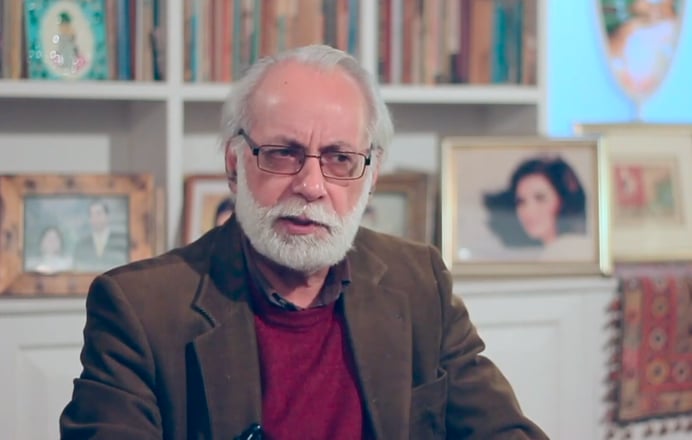The Research and Publication Centre (RPC) is an independent intellectual space in Lahore, founded by veteran journalist and leftist thinker Rashed Rahman. Created as a hub for critical engagement and progressive thought, RPC offers a platform for writers, researchers, artists, activists, and students to meet, reflect, and collaborate.
True to its founding vision, RPC is not a commercial venture. Instead, it is made freely accessible to those who work toward social justice, political awareness, and cultural enrichment. The space regularly hosts discussions, book launches, seminars, and grassroots initiatives — offering a rare environment where alternative voices and marginalized perspectives are not just welcomed, but actively encouraged.
Now entering a new phase, RPC is evolving into a digital media agency—dedicated to amplifying marginalized voices, producing independent journalism, and empowering a new generation of media and cultural practitioners in Pakistan. Building on its long-standing commitment to critical thought and progressive politics, the initiative seeks to challenge dominant narratives, promote honest and unbiased reporting, and deepen political awareness across the public sphere. Through original reporting, multimedia storytelling, and accessible analysis, RPC aims to foster a more informed, engaged, and socially conscious society—one that values truth over spectacle and justice over convenience. By bridging the gap between grassroots realities and digital media, RPC hopes to cultivate a culture of resistance, reflection, and responsible journalism in an increasingly polarized media landscape.
RPC publishes a monthly journal called Pakistan Monthly Review (PMR), which offers critical, left-leaning analysis of Pakistan’s political, social, and economic landscape. The journal also revisits overlooked histories, promotes working-class consciousness, highlights grassroots movements, and fosters dialogue between theory and practice, aiming to cultivate a politically informed and socially aware readership.
Rashed Rahman is a distinguished veteran journalist, editor, and Marxist intellectual whose work has profoundly shaped Pakistan’s independent media and progressive political discourse. Born in Lahore into a family with a legacy of public service—his father, S.A. Rahman, served as Chief Justice—he trained as a Chartered Accountant in the UK before transitioning into journalism in the late 1960s.
About the Director


Rahman later held senior editorial roles at major English-language newspapers, including The Post, The Nation, and most notably as editor of the Daily Times from 2009 to 2015, where he cultivated a reputation for defending press freedom and protecting his reporters from interference . Alongside his mainstream editorial roles, Rahman has been a key figure in revolutionary journalism—supporting voices that challenge entrenched power structures and advocating for a more democratic, decentralized, and equitable Pakistan.
Rashed Rahman is currently the editor of Pakistan Monthly Review, a left-oriented political journal that continues his lifelong commitment to critical analysis and structural change. He also contributes regularly to national and international publications, writing on media freedom, political economy, and the evolving struggles for justice in South Asia.
His life’s work and philosophy are captured in the YouTube series Fragments of a Life of Struggle, offering rare insight into his enduring commitment to principled journalism, Marxist thought, and civic empowerment.
Pakistan Monthly Review is an independent, socialist-leaning journal that has been published monthly since 2018 by the Research & Publication Centre (RPC) in Lahore. Guided by the motto “Nothing human is alien to me,” the journal is committed to critically documenting and interpreting the political, social, and economic realities of Pakistan. It provides a platform for rigorous analysis that challenges dominant narratives and brings marginalized perspectives to the forefront.
Each issue of Pakistan Monthly Review features original essays, commentaries, and theoretical reflections by scholars, activists, and public intellectuals from Pakistan and across the globe. The journal covers a broad range of themes—from working-class struggles, land rights, and gender politics to foreign policy, state repression, and global capitalism. By bridging local and international perspectives, it seeks to foster a deeper understanding of the systemic forces shaping contemporary life in Pakistan.
Published regularly and with editorial independence, Pakistan Monthly Review has become a trusted space for honest, radical inquiry. It stands apart from commercial media in its refusal to sensationalize or conform, choosing instead to prioritize depth, context, and political clarity. As part of RPC’s broader vision, the journal plays a vital role in cultivating critical consciousness, encouraging civic engagement, and supporting the intellectual groundwork for progressive change.
Collaboration With Filmbar
Filmbar is a grassroots initiative focused on screening non-mainstream, non-commercial, and critically acclaimed arthouse and experimental films—the kind of cinema rarely shown on big screens in Pakistan. It offers a space for audiences to experience bold, socially relevant storytelling that challenges dominant narratives and encourages critical thought.
Since its inception, Filmbar has screened nearly a hundred films, operating as a non-profitable project made possible through the generous support of the Research & Publication Centre (RPC), which has consistently provided the venue and resources free of charge. RPC’s backing reflects a deep belief in the transformative power of cinema—because if a picture is worth a thousand words, a moving picture can shape consciousness, stir empathy, and drive change.
Through this collaboration, RPC extends its mission of critical engagement into the realm of visual culture, using film as a powerful tool to inspire dialogue, build community, and promote progressive social values.
Films like The Battle of Algiers, Mirch Masala, Z (1969), The Cranes Are Flying, Dr. Strangelove, All We Imagine as Light, The Ascent, Hiroshima Mon Amour, Triangle of Sadness, and A Moment of Innocence have been screened at Filmbar, offering Pakistani audiences powerful, politically‑engaged narratives—from anti‑colonial struggle and feminist resistance to anti‑war critique and global inequality. These films provide a rare chance to engage with cinema that not only reflects history but challenges viewers to rethink power, justice, and social action.
Our Location
We are dedicated to creating impactful narratives that resonate with communities.
Location
2nd Floor, 65 Main Boulevard, Gulberg, Lahore
Hours
9 AM - 5 PM